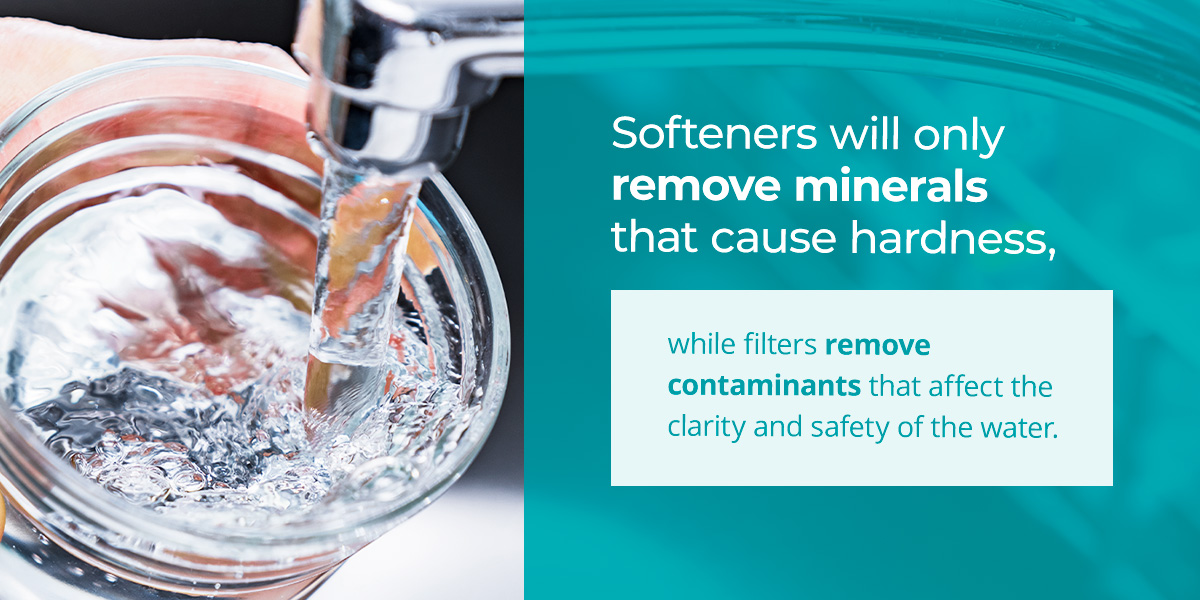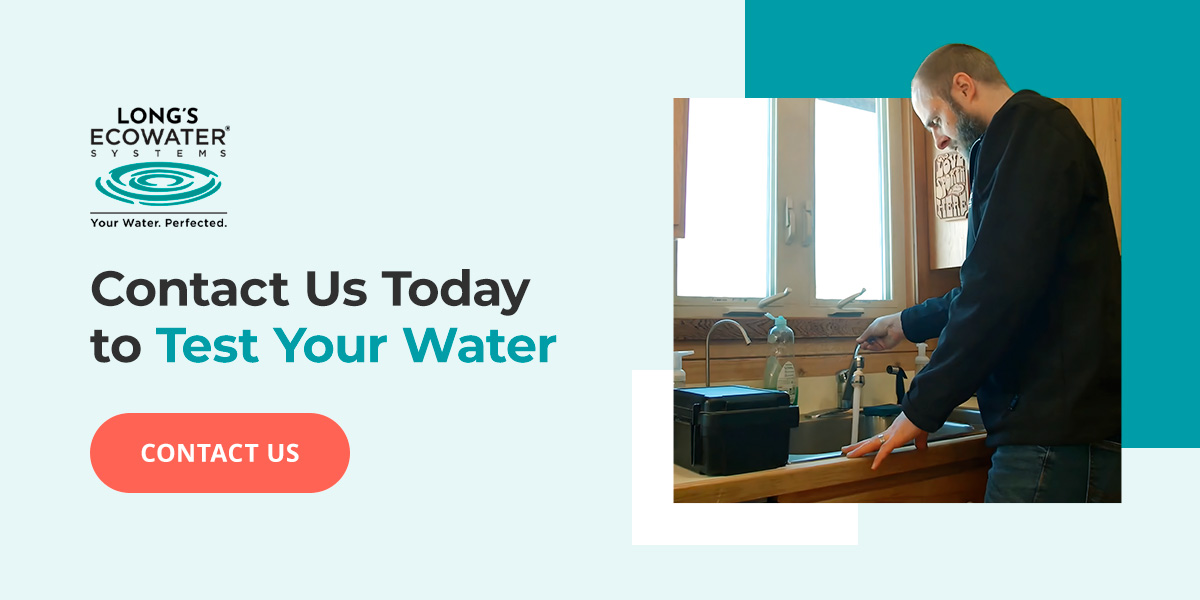Improving how water feels, tastes and affects our well-being is vital to a healthy, comfortable life. You want the water that runs out of your tap to be fresh so you don’t have to worry about what may be in it. The best products for your peace of mind are water testing methods, filters and softeners.
The following will help you understand the difference between filters and softeners, what they do to water and what challenges they can resolve.
Understanding Hard Water
To see the benefits of a water softener, you first need to understand hard water, the issues it can cause and how to spot it.
Sources of Hard Water
Hard water contains high levels of calcium and magnesium ions. Minerals leach into the water as it moves through natural mineral deposits in soil and rock in the aquifers, or surface areas, from which the system pulls the water. An abundance of calcium and magnesium classifies water as hard, but many other minerals, such as iron and manganese, can dissolve into water, which may cause staining and taste issues.
Signs of Hard Water
The high concentration of minerals builds up on surfaces like faucets and showerheads, presenting as white or gray residue called limescale. The minerals react with soap, making it harder to lather and leaving a film behind called soap scum, which is difficult to wash away. This scum makes your dishes spotty. You may also feel your hair and skin are tight and dry after cleaning.
Issues Caused by Hard Water
Limescale buildup will affect your plumbing and appliances and increase your energy bills and soap usage. This substance coats everything, becoming thicker over time. It clogs pipes and coats heating elements and moving parts, causing them to wear out faster.
Limescale will form an insulating layer in your water heater, making it work harder, shortening its lifespan and driving up your energy usage.
What Is a Water Softener?
A water softener is the solution to your hard water woes. Through a process called ion exchange, water passes through a specialized tank full of polystyrene beads, often called resin, charged with potassium and sodium ions. As the water passes through, calcium and magnesium are more strongly attracted to the beads and swap with the potassium and sodium ions.
You can purchase a salt-based softener, which uses the ion exchange process, or a salt-free softener, which uses various methods such as template-assisted crystallization (TAC) to alter the structure of the ions as they flow through. This process ensures the water doesn’t form limescale but will still contain the magnesium and calcium ions.
Water softener benefits include the following:
- Reduced scale buildup
- Improved soap lathering
- Softer skin and hair
- Lower energy bills
- Extended lifespan of appliances
To maintain your water softener system, check the salt levels at least once a month, clean the tank of any salt crust and check for leaks. For a salt-free system, follow the recommended instructions on replacing the softening media.
What Is a Water Filter?
A water filter uses various media to sift out contaminants, making drinking water healthier. The types of water filters you can get are:
- Sediment: These filters use a mesh to remove large particles like dirt, silt, rust and stones.
- Carbon: Activated carbon can be solid blocks or granules. It removes contaminants such as chlorine, lead, volatile organic compounds and some pharmaceuticals. Contaminants stick to the surface of the carbon through adsorption.
- Reverse osmosis: This system forces water through a membrane with tiny pores. The membrane filters out contaminants like minerals, bacteria and viruses, heavy metals, pesticides and more.
- UV: A highly effective method of removing bacteria and viruses. A UV light tuned to the correct wavelength will destroy the DNA structures of these microorganisms, killing them and preventing their spread.
Install these filters throughout your home on faucets, on a pitcher or under your sink. You can use one or a combination of them to improve water taste and odor, protect you from waterborne illnesses and remove contaminants that will harm you over time, such as lead.
Key Differences Between Water Softeners and Water Filters
When considering the advantages of water softeners vs. water filters, you should know the key differences between them, which include:
Purpose
Softeners will only remove minerals that cause hardness, while filters remove contaminants that affect the clarity and safety of the water.

How They Work
A softener system will use the ion exchange process, or, in the case of salt-free softeners, they’ll use one of a few processes to ensure the ions are changed enough that they won’t stick to anything. A filter uses a variety of systems to filter out everything from large particles to microscopic bacteria.
Benefits
They both have great advantages, but for different reasons. The benefits of a water softener system include leaving your skin and hair feeling refreshed and saving you money on energy bills, appliance repair and replacement costs. Filters improve the taste and smell of the water and ensure it’s clean and safe to drink.
Maintenance
Each system requires maintenance to keep it in good shape. Softeners need routine salt or cartridge replacement and cleaning, with occasional part replacement. Water filters will need more frequent replacement depending on water quality and usage. However, the replacement is usually quick and easy.
Cost
Prices of both will vary by size, brand and features. Water softeners have a higher upfront cost but lower ongoing maintenance costs. A filter system will have a lower price point if you’re looking at an under-sink or pitcher option — whole-house use systems will be more expensive.
Annual replacement filter costs can increase, especially for multistage systems, but they’re cheaper in the long run than drinking unhealthy water.
Which Is Right for Your Home?
To determine the right system for your home, the first step is to test your water quality and prioritize whether hard water or contaminant removal is more important, and if both are required, consider a combination. For example, improving your water’s taste and hardness requires a softener and a carbon filter.
Long’s EcoWater Solutions
To gain the advantages of soft, clean water, we offer a range of water treatment services from EcoWater, the global leader in cutting-edge water treatment systems:
- Water testing
- Hard water treatment
- Whole home water filtration
- UV water treatment systems
- Commercial water treatment services
- Phyn Plus leak detection devices
- Well system emergency services
- Water heater repair and replacement
- Water softener repair and installation
Contact Us Today to Test Your Water
Experience excellent customer service and commitment to providing expert advice and quality products with Long’s EcoWater Systems. We’ll customize a water treatment solution for you, whether you have well or city water. We’ll handle everything from installation to regular maintenance.
Contact us for a free water test and consultation so we can start purifying and softening your water.

